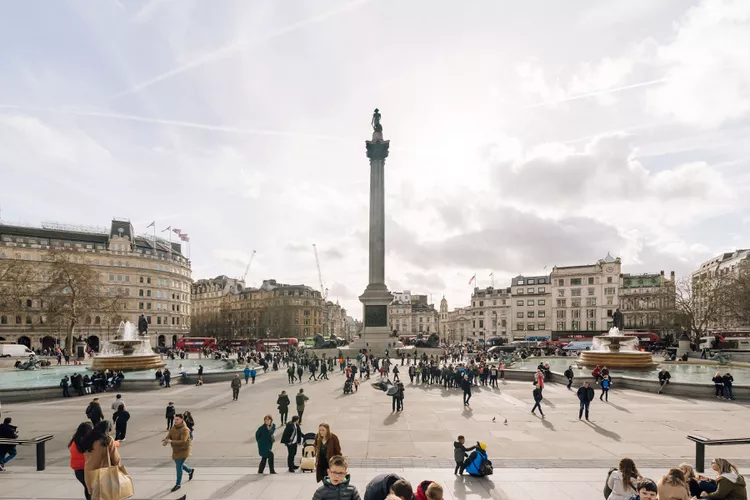Summary
Trafalgar Square: A Central London Gem
Trafalgar Square, located in the City of Westminster, is an iconic public square in Central London, designed by architect John Nash during the 1820s and constructed in the 1830s. It serves as a bustling hub for tourists, local citizens, and political activism.
Each December, Norway generously donates a stunning Christmas tree to express gratitude for Britain’s role in their World War II liberation, which is prominently displayed in the square.
The closest tube stations to Trafalgar Square are Charing Cross and Leicester Square, making it easily accessible for visitors.
Nelson’s Column
:max_bytes(150000):strip_icc():format(webp)/nelson-column-at-trafalgar-square-in-city-against-cloudy-sky-649171925-595bc4b05f9b58843f30395e.jpg)
Completed in 1843, Nelson’s Column honors Admiral Horatio Nelson, a hero of the Napoleonic Wars. The column stands over 169 feet high and is adorned with four bronze relief panels illustrating key naval battles. Additionally, the iconic bronze lions at its base were designed by Edwin Landseer and added in 1868. Visitors can climb onto the base for photo ops, though sitting on the lions is prohibited.
St. Martin-in-the-Fields
:max_bytes(150000):strip_icc():format(webp)/St.Martin-in-the-Fields-5-1a1cce3e0969428cb6db1d864e3efc0f.jpg)
Located at the northeastern corner of Trafalgar Square, St. Martin-in-the-Fields is a remarkable church dating back to the 13th century, with its current structure completed in 1726. The impressive Corinthian portico serves as a model for Colonial-style architecture in America. Furthermore, it serves as the official parish church for Buckingham Palace, featuring royal boxes for dignitaries.
The church is not just a place of worship; it also provides shelter for the homeless and houses the London Brass Rubbing Centre. Additionally, the venue boasts a delightful self-service cafe in the crypt, often hosting jazz nights on Wednesdays.
The National Gallery
:max_bytes(150000):strip_icc():format(webp)/NationalGallery-1-5c82a8e046e0fb00015f8f43.jpg)
The National Gallery occupies the entire north side of Trafalgar Square, showcasing masterpieces from renowned artists like Botticelli, Titian, and Michelangelo. Established in 1824 to display a collection originally purchased from Russian businessman John Julius Angerstein, the gallery now houses over 2,300 paintings spanning from the mid-13th century to the 1900s.
As the eighth-most visited art museum worldwide, the National Gallery offers visitors the chance to view significant works, including Van Gogh’s A Wheatfield With Cypresses and Canaletto’s The Stonemason’s Yard.
Canada House
:max_bytes(150000):strip_icc():format(webp)/CanadaHouse-2-0fda8748195f474aa6ffb90290f04e21.jpg)
Positioned on the west side of Trafalgar Square, Canada House has functioned as the High Commission of Canada’s offices in the UK since 1925. The building, crafted in the Greek Revival style, opened in 1827 and is constructed from Bath stone.
While most parts of the building remain closed to the public, the Canada Gallery is accessible, showcasing Canadian art and craft.
The Fourth Plinth
:max_bytes(150000):strip_icc():format(webp)/FourthPlinth-5a0ebc9d494ec900376baec5.jpg)
The Fourth Plinth, located in the northwest corner of Trafalgar Square, was designed by Sir Charles Barry in 1841, originally intended for an equestrian statue. However, due to budget constraints, it remained empty until 1999 when the Fourth Plinth Commissioning Group began selecting temporary art installations from leading artists, changing every two years.
Admiralty Arch
:max_bytes(150000):strip_icc():format(webp)/admiralty-arch--on-the-mall--designed-by-sir-aston-webb--completed-in-1912--in-westminster--london--england--united-kingdom--europe-148690296-595bc5305f9b58843f31b8b2.jpg)
Admiralty Arch stands as an impressive gateway to The Mall from Trafalgar Square, leading visitors toward Buckingham Palace. Constructed in 1910 to honor Queen Victoria, its central gate is exclusively opened for royal processions. After serving government functions until 2011, the Arch was leased in 2012 for redevelopment into a luxury hotel and residences.
Whitehall and Big Ben from Trafalgar Square
:max_bytes(150000):strip_icc():format(webp)/england--london--view-from-trafalgar-square-down-whitehall-to-big-ben-126550372-595bc56c3df78c4eb691d812.jpg)
To the south of Trafalgar Square, Whitehall connects to Parliament Square, serving as the location for nearly all major UK government offices since the 16th century. Visitors can also glimpse the famous Big Ben, a clock tower that was renamed Elizabeth Tower in 2012 in honor of Queen Elizabeth II’s Jubilee.
South Africa House
:max_bytes(150000):strip_icc():format(webp)/SouthAfricaHouse-1-55b53489239948be94b8e137833ea9e4.jpg)
Located on the east side of Trafalgar Square, South Africa House has been the base for the South African High Commission since 1935. It features classical architecture with arts and crafts detailing. Though closed to the public, it stands as a significant landmark with historical relevance, especially noted for the anti-Apartheid vigils held there in the late 20th century.
National Portrait Gallery
:max_bytes(150000):strip_icc():format(webp)/NationalPortraitGallery-3-5c82d21346e0fb00012c66c0.jpg)
Founded in 1856, the National Portrait Gallery holds the world’s largest collection of portraits depicting influential Britons from the Tudor period to modern times. The gallery features a mix of paintings, drawings, and photographs, reflecting Britain’s cultural history.
The gallery also hosts rotating exhibitions, including unique showcases such as the impact of Michael Jackson on fashion. It remains open daily to the public, with extended hours on Friday evenings.




